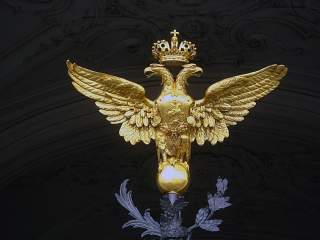What Does It Mean to Be Conservative in Russia?
The Russian right is more than tsars and samovars.
I asked him whether there are different shades of Russian conservatism. There are, he says. Boris and the team behind the Russian Idea call themselves “conservative democrats.” While an oxymoron for an American reader, it actually makes sense in Russia. Conservative democrats have a number of right- and left-wing ideas—they champion communities, they’re loyal to the regime and they oppose radical changes, but they also oppose big money and the damage it has done to Russian society in the last two decades.
The opposite of conservative democrat would be an authoritarian liberal. It may also seem like “black snow” but it actually refers to the aggressive dogmatism of the liberal order and the way it is promoted in many cases against the will and the interests of the local communities. According to Boris the reaction to this sort of liberal authoritarianism in America is called “Donald” and “Bernie”—anti-establishment candidates that criticize and challenge every notion. In the Russian context, the opponent is a liberal manager that operated in the 1990s and 2000s—the likes of Anatoly Chubais and Alexei Kudrin.
There is another conservative democratic movement: the national democrats. This movement embraces and promotes nationalist ideas and includes such people as Konstantin Krylov, Natalia Kholmogorova, Viktor Militarev that also publish with the Russian Idea. The main difference between the two is while conservative democrats are loyal to the regime, the national democrats are in opposition. In fact Konstantin Krylov was elected to the Coordination Council of the protest movement in 2012, he also spoke during massive rallies in December 2011 on the same stage with the liberal opposition.
It may seem surprising that Russian nationalists and Putin are not necessarily on friendly terms, since Putin is typically presented as a nationalist leader trying to reassemble the Russian lands. The reality is more nuanced and the explanation deserves a separate article. To give a brief summary: some nationalists were part of the political protest in 2012 against Putin, some were also extremely unhappy that Putin showed no interest in supporting Novorossiya and as a result the leading voice of the Russian Spring (not as in “Arab spring” but as in Crimean and Novorossiyan spring), the website “Sputnik and Pogrom,” has seen pogroms in its own offices when the Russian authorities knocked on the door. Turns out in Russia you can be a conservative national democrat and be in opposition to Putin, who is also a conservative. Not your typical Sunday read.
However, both movements have a strong common element—support for democracy—and this sets them apart from other elements of the conservative camp. There are monarchist conservatives, represented by Alexander Dugin, Orthodox entrepreneur Konstantin Malofeev, etc. “Monarchist” does not mean that they aim to reinstall the Tsar. In fact, some people call them Stalinists (I know), and Boris tells me that they are a Russian version of neocons. America’s neocons were keen to promote democracy and neoliberal order, and Dugin and the company think that Russia should undo what the neocons did and save Europe from the Anglo-Saxon influence. If the final fight with America means death, then death it is. Boris thinks that if neocons come to power in Washington it is of course very bad for Russia, but since they came to power democratically; he accepts it and sees no point in channelling energy into this. Dugin’s transformation from a champion of Eurasia into a fringe monarchist also deserves a separate piece, sorry!
Last but not least there is an ultraconservative statist movement represented by the influential Izborsky Club and the likes of Sergey Kurginyan, Alexsandr Prokhanov, Mikhail Delyagin, Andrei Fursov, Maxim Shevchenko and Mikhail Leontiev. The movement is 100% loyal to the regime, can be way too passionate and creates serious divisions in the society that it is not interested to unite. Some parts of the movement deserve the label “Stalinist." But this is not a united movement and the member of the Izborsky club regularly clash with each other and sometimes spare no harsh words. This is the only branch whose members are close enough to the regime by holding some official jobs, like membership in the Civic Chamber of Russia. Other conservative movements do not have any politicians among them.
So I ask Boris one last question—United Russia and the people in power, where do they fit? By default, he says, they are conservative. By default most of them have limited public personas (there are actually MPs who never said a word on record in the Parliament). Conservatives at the service of the state, regime and society—who are they? Liberal opportunists, says Boris. Maybe the 2006 version of me knew better after all.
Yulia Netesova is a journalist and currently a visiting fellow at Centre for International Studies, London School of Economics and Political Science.
Image: Russian arms at the Winter Palace. Photo via Pixabay/jorisamonen.

